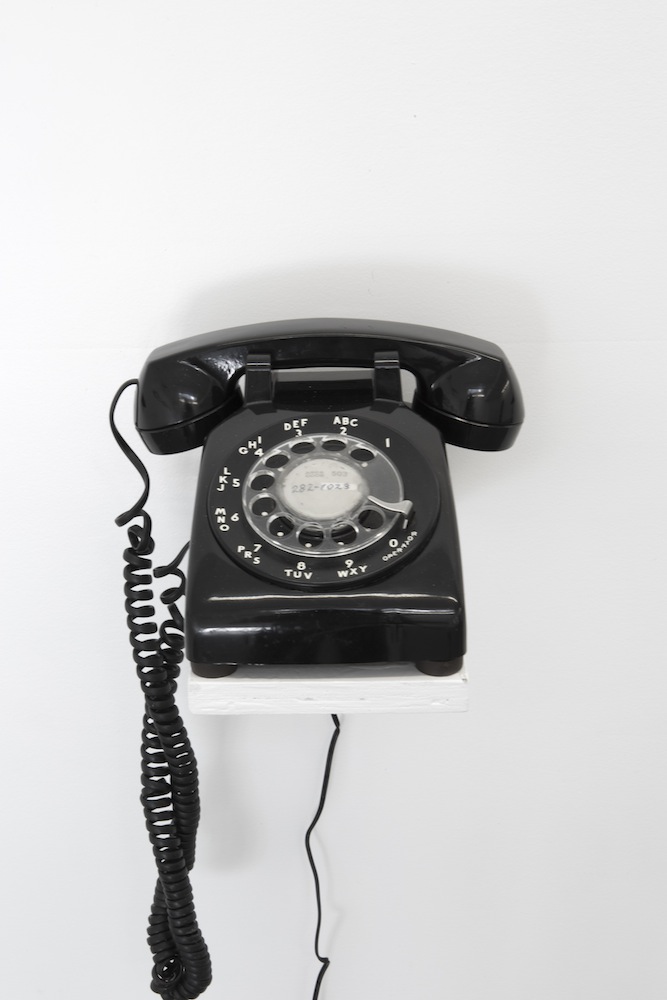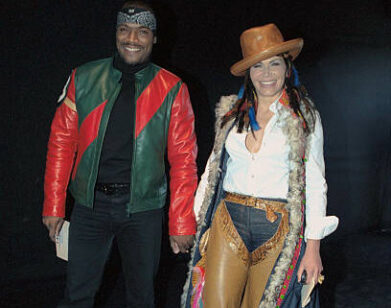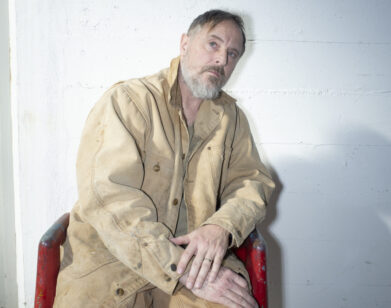Have a burning secret? Dial this number
Is there something you need to confess, perhaps a secret you’d like to get off your chest? Call 917-809-7319 to be heard—or, to listen. Gideon Jacobs and Gregor Hochmuth’s Confession has taken over 1,000 admissions to date. The service is completely anonymous. Once connected with a listener at random, the confessor may speak for as long as the listener remains on the line. Jacobs and Hochmuth keep no demographic details about participants, and store only the audio of the call and the time it took place. Today, the project takes physical form at Deli Gallery in Queens, New York. For the first time, one can hear these confessions without calling in for the live experience, through six rotary phones pre-loaded with a curated selection of recordings.
Confession began when Jacobs and Hochmuth met and, according to Jacobs, “liked the way each other thought.” Hochmuth’s interest in phones and Jacobs’ in religion resulted in the hotline, which launched over a year ago and remains live (the pair have not yet set an end date). While neither Hochmuth nor Jacobs are religious, and have not confessed in the Catholic sense of the word—though Jacobs admits he’ll sometimes Yelp for nearby churches if he has free time, simply so he can sit on a pew—they see value and power in the ability to speak freely. “Some of the confessions are so powerful that you really want to jump in, you want to scream into the receiver, but you can’t,” says Hochmuth, “and yet you know that just being there had an effect.”
Earlier this week, Interview spoke to Jacobs, 28, a writer and the former creative director of Magnum Photos (as well as a child actor who appeared in Wet Hot American Summer), and Hochmuth, 32, an artist and engineer who formerly worked at Google, Facebook, and Instagram (he was their eighth employee), about seeking connection and telling the truth.
HALEY WEISS: I’d like to hear about what it’s been like figuring out how to translate this into a physical space, because the project’s existed for about a year now.
GREGOR HOCHMUTH: When we first put the project out, we didn’t think that it would have any traction or know if anyone would call; we had no [sense] of what it would become or what it would be. For us, we thought maybe a few people would call, maybe a few people would connect, given that it does require people calling at the same time. And then as soon as we put it out, within a day or two, we suddenly got dozens and dozens and dozens of confessions in one day, and many, many hundreds more over the course of the project up until now.
About a year later, this opportunity presented itself to bring it into a physical space. At that point we had to readjust and understand, what does this want to be? Given that initially it was supposed to be ephemeral, in the moment, people calling at the same time. Keeping a number of the qualities that made the project what it is felt really important, so the intimacy of this ephemerality, the fact that you can only hear one person at a time, and lastly, the starkness or ascetic quality. It wasn’t supposed to be flashy. It was supposed to be very muted, very simple—this very Catholic, downplayed experience.
GIDEON JACOBS: I think Catholic was a key word.
WEISS: I was going to ask about the religious overtones.
JACOBS: I think we’re in a country right now where, for the most part, it’s common to hear that people are increasingly spiritual but decreasingly religious, or, “I’m not religious, I’m spiritual.” Don’t throw the baby out with the bathwater! There are traditions and value in a lot of the more institutional religious rituals. I was very interested in finding a secular way to re-invigorate the practice of catharsis via repentance, or catharsis via unburdening. Looking at the internet, that is what most of the internet is, people wanting to be seen, wanting to be heard, wanting to get something off their chest. So although we were really surprised at how many calls we were getting, if you just look at the internet, and look at any comment thread, the appetite is there.
HOCHMUTH: If I had to give my summary of what people are talking about, it really is just love at the end of the day and its very different directions. There’s being in love with a person that can’t be in love, and being rejected; loving someone that they’re hated for, so being gay or coming out; being in love with two people; or not being loved, being scorned; or not being loved by your parents, not being loved by your friends. So many of the calls have that as the undertone, and I think it connects, for me, so directly and personally with this idea of being heard. We’re seeking to be seen and loved by other people, and this becomes the lack of that or the pain associated with that, because somewhere we want to be able to share that. It’s such a powerful emotion in the positive and the negative. If I can’t share with the person that I want to share it with, I still need to share it, I still need to talk about it, because I can’t let it go in any other way, either the pain or the joy or the conflict. That’s what I found so, maybe not surprising, because it is such a powerful, universal thing, but it did strike me that this was the undertone of so many of the calls that came in—often in pain, some in a sort of uncertainty or disbelief about what to do.
JACOBS: Desperation is a feeling that we get in a lot of the calls. If people are choosing this to unburden themselves, usually they’ve tried other things first, I would say. There are a fair amount of projects that are similar to this project and there are technologies that are similar, like PostSecret or ChatRoulette, but what in my opinion makes this a little bit different is the equation that Greg and I stumbled upon, which is that the line is only live if somebody is listening or if they’re still there. So there’s something at stake. If you just post on Craigslist a long rant about how you’re feeling, you’re pissing in the wind. There’s really no way to know if you’re being heard and no way to feel that gratification, or have the stakes of you being heard. I think being heard actually raises the stakes of the confession. The one thing that Craigslist, for example, does provide is anonymity, where something like Facebook doesn’t. If you post a rant on Facebook, it feels dangerous. You don’t feel safe. The combination of that safety with there still being stakes is, to me, what I hope makes it a truly cathartic experience to confess.
HOCHMUTH: Yeah, and what it adds for me if you talk about the internet—the fact that this happens on the internet all the time in different media and different forms—is that the internet often has this incentive for feedback. You post, and you ultimately also post to get replies, not just to be seen, but to have someone get back to you, validate you or such, whereas here you explicitly know that can’t happen. The catharsis just comes from knowing that you can get this off your chest. There’s no expectation of advice. All you want to do is tell someone, tell a stranger, and you’re not doing it because you want someone to give you a like or write you a reply. It’s really about knowing that you’re not the only one.
JACOBS: You just reminded me—or really, made me realize—I don’t know if either of you have ever been to therapy before, [laughs] but one of the interesting things about any sort of talk therapy is you hear yourself say something. What happens when you have the blank slate of speaking, when you just have space to fill? The project is an audio project, you’re not typing it, you’re not writing it, so the fact that you face this silence when you call in but you know someone is there, I think of it like being face-to-face with a therapist watching you. Then the next thing you know, you’re saying stuff that you didn’t always realize you felt or realize you thought. There’s this power in hearing your voice articulate something.
WEISS: What do you think keeps people on the line? Voyeurism, feeling like they owe the person that time?
HOCHMUTH: It’s a very electrifying feeling to be connected. You don’t know what’s going to happen next; it’s like a live TV show or something. You have no clue what they’re going to say. They’re building up this narrative. In many ways, you want to know how it’s going to end: What are their last words? When do they think it’s over? What have I not heard? When do they feel complete? It’s very much this intimate progression of someone’s feelings or emotions, and in that way I think it starts with voyeurism, and by the end it’s about this unknown territory where you don’t know where they’re going to take you.
JACOBS: I have a bit of a darker take on it. We’ve spent a couple weeks now going through this audio, and I think people are very sad and very lonely, and I think people are in a lot of pain, and I think people are very bored. I sense a total desperation for something, just something to happen, or some sort of connection … Maybe I’m projecting a little. [Hochmuth laughs]
WEISS: The last line on the website is “the truth will set you free.” Do you believe that?
HOCHMUTH: I deeply believe that. In many ways, honesty is the only, best thing. Life feels much lighter if you’re always truthful and honest.
JACOBS: It’s a cliché. We threw it in there for a couple reasons. The truth is a tricky thing, but truth is actually just the easiest thing to do, because it requires no imagination. You don’t have to keep track of it, which I think is a great relief. You don’t have to make anything up. You don’t have to keep track of what you made up. The truth is real; the story is already written, you don’t have to write it.
HOCHMUTH: There was a [conversation I had] recently with a friend, and she said, “Whenever I have a large problem, my best way of getting through it is to tell someone about it.” I think as a process of dealing with someone, there is no better way to share with another person and know that you’re not alone; they can reaffirm you and reassure you. And the only way to really do it is be sincere with that person, like, why make up a lie? Why make up another version of the truth when you can talk about what happens or how you feel, rather than how you want to be seen?
JACOBS: To be alone with the truth is really painful.
WEISS: You talked about how a lot more people identify as spiritual now or perhaps agnostic—I don’t know what the actual numbers would be on that—but I wonder if you think there’s something missing without that element of religion, of spirituality, that practice that’s been lost.
HOCHMUTH: One book that I’ve really liked that I’ve read over the last few years is Religion for Atheists by [Alain] de Botton, where what he basically does is break apart major religions and look at what they do really well separate from the spiritual parts. He singles out all these practices that developed over millennia to help communities live together and create bonds, and that part resonated with me. It’s this idea that we’re throwing out religion wholesale, because in a secular society we don’t want the bundle of spirituality and these practices, and yet many of the practices are really useful, they’re cathartic, they relieve tension and other things. For me, the confession is one of them. The Jewish religion has many other beautiful rituals that are really helpful in a community setting, and yet we have completely thrown all of them out in the secular world. I didn’t grow up religious at all, and so in many ways, you wonder how people actually deal with these needs that they have, like being listened to, having someone reassure them, reaffirm them, or letting go of grievances. How does that happen in a secular world? The best we’ve come up with so far are things like Facebook and Craigslist, and those aren’t healthy. They’re not healthy places. I’m not saying our number is a good replacement for it, but in general, what do these practices look like today is an open question, and one that people who are not religious struggle with.
WEISS: I’m surprised you say that they’re not healthy, because didn’t you work at Instagram in the beginning?
HOCHMUTH: Yeah, but that doesn’t mean they’re healthy. I worked at Instagram early, when it was small, and, I would say, very much at the core just people connecting over photos. I think seeing the inside of Facebook gave me a very different picture of how these networks operate and what their true intentions are. And separate from how they operate, how they’re used often is not even in their control. What happens in the human interactions is completely up to the rest of the world.
“CONFESSION” IS ON VIEW AT DELI GALLERY IN NEW YORK THROUGH SEPTEMBER 3, 2017. FOR MORE ON GIDEON JACOBS, VISIT HIS WEBSITE. FOR MORE ON GREGOR HOCHMUTH, VISIT HIS WEBSITE.







